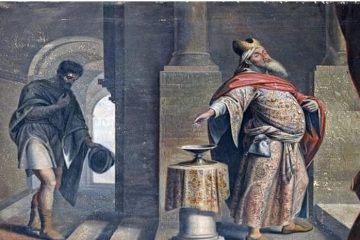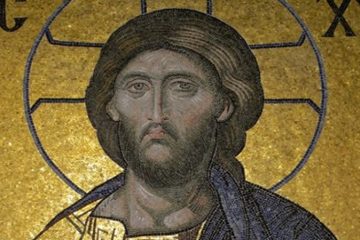Fr. Lev Gillet
Strictly speaking, Lent ends on the Friday which follows the fifth Sunday of Lent: the period of forty days is then over. The time of the Passion lasts from the end of Lent until the Resurrection, anticipated on Holy Saturday. It therefore comprises the Saturday which follows the fifth Sunday of Lent, called ‘Lazarus Saturday’, and the first six days of Holy Week.
Lazarus Saturday has a very special place in the liturgical calendar. It is not included in the forty days of Lenten penitence; it is not included in the harrowing days of Holy Week – which are counted from the Monday to the Friday. Together with Palm Sunday, it forms a short and joyous prelude to the days of grief which follow. A topographical link unites it to Palm Sunday: Bethany is the place of Lazarus’s resurrection, and it is also the point of departure for Jesus’s entry into Jerusalem. Lazarus’s resurrection, which this Saturday commemorates, is an event that, as we shall see, carries a very deep meaning. It is mysteriously linked to the resurrection of Christ himself; in relation to that event it is like prophesy in action.
One could say that Lazarus raised from the dead is shown to us, at the threshold of the Easter feasts, as the precursor of Jesus Christ triumphant over death, in the same way that, on the threshold of Epiphany, John when he baptized was the precursor of the Messiah who was about to be revealed. But, as well as its principal significance in relation to the resurrection of Christ, the raising of Lazarus has secondary aspects which will be useful to stop and meditate on.
The epistle read at the liturgy (Heb. 12. 28 – 13. 8) has no direct bearing on the raising of Lazarus. All the same, one of the verses – ‘Remember them that are in bonds, as bound with them; and them which suffer adversity, as being yourselves also in the body’ – could, by a spiritual exegesis, be applied to the compassion shown to Lazarus by Jesus. The epistle contains various moral precepts: to continue in brotherly love, to practice hospitality, to honour marriage, and to obey our superiors. Those who may be tempted to pass fleetingly over these ethical recommendations, judging them to be important, of course, but really rather elementary, should read with attention the three verses in which they are set, one at the beginning, another in the middle, and a third at the end: ‘Our God is a consuming fire…
For he hath said, I will never leave thee nor forsake thee… Jesus Christ the same yesterday, and today, and forever’. For the highest spiritual truths cannot be isolated from these very simple practical imperatives which form their daily currency.
The gospel (John 11. 1-45) gives an account of the raising of Lazarus. The interpretation of this event given to us by the Church is contained in the chants for matins. Let us listen to them.
‘When Thou didst wish….O my Saviour, to establish the truth of Thy glorious Resurrection, Thou didst deliver Lazarus from Hades….’ Here we find expressed the principal meaning of the raising of Lazarus. It was, as the sacred poem says in language that is a little strange, but striking: anticipation, ‘establishing the truth’ of the resurrection of Christ, a preliminary proof of Jesus’s power over death. ‘Through Lazarus, O Death, Christ has released thy captives….Before Thy death, Thou hast shaken the power of death’. The Church establishes a certain link between this victory of Christ’s over death, and the triumphal entry into Jerusalem which will be celebrated the next day. ‘O Death, where is thy victory?…We offer Him the palms of triumphant victory… Like the children, we carry tokens of victory and acclaim Thee, who art the conqueror of death’.
In the second place the raising of Lazarus announces the resurrection of the dead which is a consequence of Jesus’s resurrection: ‘O Christ, when Thou didst bring back Lazarus to life from amongst the dead, Thou didst establish the principle of universal resurrection… Thou didst raise him, Thou the giver of life, thus confirming the resurrection of the world… Through Thy friend as intermediary Thou didst predict that humanity was released from corruption’. Lazarus Saturday is, in a way, the feast of all the dead. It gives us the opportunity to confirm and give precision to our faith in the resurrection.
Our Lord, in correcting Martha’s state of mind, gives us precious teaching about our own dead, for when he had said to her: ‘Thy brother shall rise again’, she had replied, ‘I know that he shall rise again in the resurrection at the last day’, and Jesus said, ‘I am the resurrection’. Martha’s faith was insufficient in two ways: she thought of her brother’s resurrection in terms of the future, and only of the future, and then she could not conceive of this resurrection except in relation to some sort of general law. But Jesus indicates that the resurrection is a fact which is already actual, because he himself is (and does not bring about) resurrection and life. Our dead live through and in Christ. Their life is bound up with the personal presence of Jesus, and is manifested in it. If we seek to unite ourselves in spirit with someone who is dead that we love, let us not try to revive him in our imagination, but enter into contact with Jesus, and in Jesus we shall find him.
Thirdly, the resurrection of Lazarus is a wonderful illustration of christological dogma. It shows us how, in the person of Jesus, human and divine nature are united – without confusion: ‘O Christ, by Thy presence at the tomb of Lazarus Thou hast confirmed our faith in Thy two natures…’ For, on the one hand, in Jesus, man can give way to emotion and grieve for the loss of a friend: ‘Jesus wept. Then said the Jews, Behold how he loved him!’ On the other hand, God, in Jesus, can command death with authority: ‘He cried with a loud voice, Lazarus, come forth. And he that was dead came forth…’
Finally, the resurrection of Lazarus allows a sinner to hope that, even though he seems spiritually dead, he could come alive again ‘So I pray to Thee, O Thou lover of mankind, to raise me to life, I, who through my passions am dead…’ Sometimes this spiritual resurrection seems as impossible as that of Lazarus: ‘Lord, by this time he stinketh: for he hath been dead four days…’ For all things are possible to Jesus – the conversion of the most hardened sinner as much as the raising of the dead: ‘Jesus said, Take ye away the stone…’
This is what we shall learn if, on this Saturday, we go to Bethany, to Lazarus’s tomb. We want to meet Jesus at Bethany and to start Holy Week with him, close to him. Jesus invites us to be there and waits for us. Martha goes to say, in secret, to her sister: ‘The Master is come and calleth for thee’. And Mary, ‘as soon as she heard that, she arose quickly and came unto him’. The Master calls me. He wants me to stay with him, not to leave him throughout the days of his Passion. During these days he wants to reveal himself to me- who perhaps, ‘already stink’- newly and overwhelmingly. Master I come.
Source: pemptousia.com




0 Comments